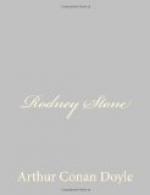“Well,” said she, laughing like one who is hurt, “you have no cause to say anything, for I read on your face what you have been taught to think of me. So this is the upbringing that you have had, Jim— to think evil of that which you do not understand! I wish you had been in the theatre that very night with Prince Florizel and four Dukes in the boxes, and all the wits and macaronis of London rising at me in the pit. If Lord Avon had not given me a cast in his carriage, I had never got my flowers back to my lodgings in York Street, Westminster. And now two little country lads are sitting in judgment upon me!”
Jim’s pride brought a flush on to his cheeks, for he did not like to be called a country lad, or to have it supposed that he was so far behind the grand folk in London.
“I have never been inside a play-house,” said he; “I know nothing of them.”
“Nor I either.”
“Well,” said she, “I am not in voice, and it is ill to play in a little room with but two to listen, but you must conceive me to be the Queen of the Peruvians, who is exhorting her countrymen to rise up against the Spaniards, who are oppressing them.”
And straightway that coarse, swollen woman became a queen—the grandest, haughtiest queen that you could dream of—and she turned upon us with such words of fire, such lightning eyes and sweeping of her white hand, that she held us spellbound in our chairs. Her voice was soft and sweet, and persuasive at the first, but louder it rang and louder as it spoke of wrongs and freedom and the joys of death in a good cause, until it thrilled into my every nerve, and I asked nothing more than to run out of the cottage and to die then and there in the cause of my country. And then in an instant she changed. She was a poor woman now, who had lost her only child, and who was bewailing it. Her voice was full of tears, and what she said was so simple, so true, that we both seemed to see the dead babe stretched there on the carpet before us, and we could have joined in with words of pity and of grief. And then, before our cheeks were dry, she was back into her old self again.
“How like you that, then?” she cried. “That was my way in the days when Sally Siddons would turn green at the name of Polly Hinton. It’s a fine play, is Pizarro.”
“And who wrote it, ma’am?”
“Who wrote it? I never heard. What matter who did the writing of it! But there are some great lines for one who knows how they should be spoken.”
“And you play no longer, ma’am?”
“No, Jim, I left the boards when—when I was weary of them. But my heart goes back to them sometimes. It seems to me there is no smell like that of the hot oil in the footlights and of the oranges in the pit. But you are sad, Jim.”
“It was but the thought of that poor woman and her child.”
“Tut, never think about her! I will soon wipe her from your mind. This is ‘Miss Priscilla Tomboy,’ from The Romp. You must conceive that the mother is speaking, and that the forward young minx is answering.




